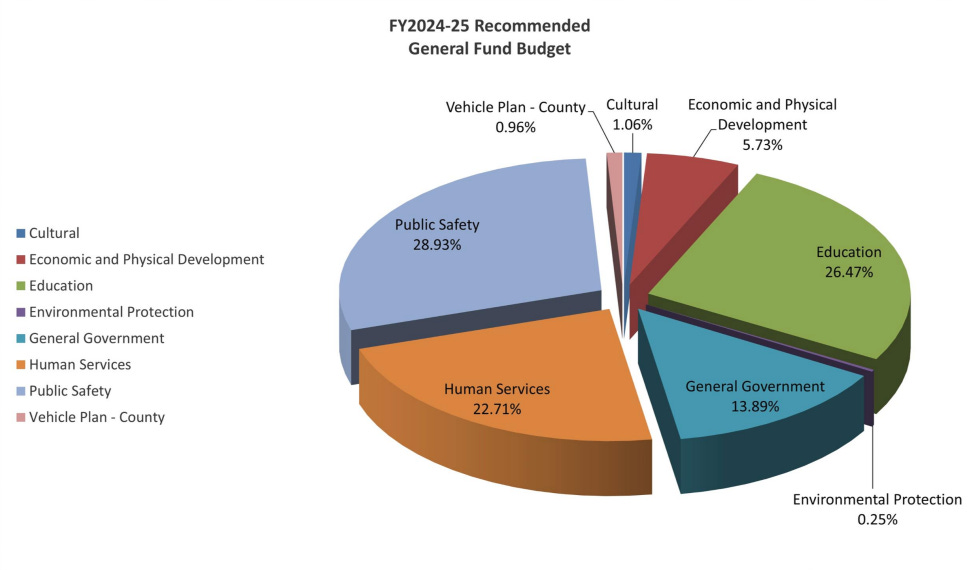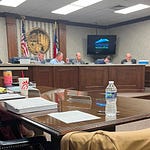Producing high-quality, in-depth news takes significant resources. At Lake Lure News / Cops & Congress, facts come first, followed by in-depth commentary and analysis. Your subscription helps support independent journalism that brings you closer to the decisions shaping the community and ensures I can continue delivering the stories that matter most.
Thanks for Tuning In — And Why Your Support Matters
A heartfelt thank you to everyone who tuned into my livestream of the May 5 Rutherford County Commissioners meeting on Facebook. As I’ve previously reported, the county does not immediately post official archived videos of these meetings, so I’ve made it a priority to provide real-time access whenever possible. That said, it wasn’t easy this time. The county recently adjusted the room layout and camera angles in ways that made filming more cumbersome, like replacing a handy outlet-side seat with a decorative plant. Coincidence? Maybe. But I made the most of it.
Internet in the meeting room continues to be unreliable, so if the livestream looked a bit choppy, I appreciate your patience. Between tech hurdles, blown tires (yes, that happened on the way—thanks to my husband for the roadside rescue), and mounting costs, I’ll be honest: I need 10 more paid subscribers just to break even on gas and time to keep covering these meetings in person. If local accountability journalism matters to you, now’s the time to show it.
Now, onto the meeting recap with facts and analysis you won’t find anywhere else.
RUTHERFORDTON, NC — The Rutherford County Board of Commissioners met Monday, May 5, for a wide-ranging meeting packed with decisions affecting schools, mental health care, emergency services, and future tax implications. Here are the top 10 takeaways you need to know. (ICYMI: Here’s meeting documents in one place; otherwise, the county requires you to download them locally from their website.)
1. Commissioners Greenlight Economic Incentive for Project Newco
A new business could be headed to Golden Valley—though officials wouldn't confirm the exact site—bringing jobs averaging $59,500/year. The county approved a resolution for a five-year local economic development grant, with a possible extension if hiring and investment goals are met.
2. $137K “Maintenance of Effort” Request from Partners Health Management Approved
The board approved continued funding for behavioral health services provided by Preferred Choice Healthcare at the county jail. It includes several other initiatives and lists “United Way - grant writing assistance.” The document did not explain what exactly that means or how many grant applications it includes.
3. Public Education Advocacy Turns Passionate
Teachers, parents, and even a 5th grader delivered emotional pleas during public comment, urging the board to fully fund public schools. Speakers cited a $23 million local funding gap over the past 14 years and warned that educators shouldn't be left to pay for supplies out of pocket.
4. Competing Voices on Tax Policy
Resident Eric Gorney warned that spending from reserves could lead to future tax hikes, calling for budget cuts instead. His comments highlighted a growing divide between those who want full funding for services and those worried about rising costs for lower-income families. This is the same man who Garrison said his comments were “bullshit” last year.
5. County Proclaims May as ‘Older Americans Month’
Tammy Aldrich of the Senior Center reminded the board that aging doesn't mean slowing down. A proclamation was unanimously passed recognizing the contributions of older residents and promoting active senior lifestyles.
6. May 18–24 Declared EMS Week in Rutherford County
Emergency Medical Services professionals will be honored later this month. Commissioners acknowledged the dedication of local EMS providers who routinely place community needs above their own.
7. County Begins Recruitment for Board Vacancies
Commissioners voted to advertise openings on various county boards and commissions, with applications to be reviewed in a future session. Residents are encouraged to apply through the county website. Several other appointments were approved.
8. State Loan Program Adjusted to Aid Flood Recovery
The board approved a resolution amending its state disaster recovery loan agreement to avoid a previously required five-day payback clause. The change ensures the county can better manage its cash flow while awaiting FEMA reimbursement.
9. Budget Presentation Reveals Major Financial Pressures Ahead
County Manager Steve Garrison unveiled a sobering $107 million budget request in his presentation, including large increases in education and public safety costs. However, the data shows a different analysis (story to come). Inflation, wage competitiveness, aging infrastructure, and hurricane damage contribute to budget uncertainty.
10. Plans Begin for Major Infrastructure and School Needs
Garrison said planning for a new jail, courthouse, and high schools must start now to replace Chase and East Rutherford, with costs projected in the hundreds of millions. No new construction has been locally financed since 2015, raising concerns about future debt.
Why it matters:
From school funding to emergency preparedness, May’s meeting made it clear that Rutherford County faces tough choices. Community input, fiscal transparency, and long-term planning will be critical in shaping the county's future.
Garrison said, “I do not quite have a good understanding or comprehension (of) how low-wealth funding is maximized (for school funding). My understanding is that the amount of local county appropriation impacts the formulary used to permit the school system to draw down additional low-wealth funding. Yet the full funding for SROs is not included in the local appropriation to the school system. Does that not impact their drawdown of additional low-wealth funding?” It doesn’t under existing state law.
Low-wealth funding is part of a state law where basic math is combined with tax outlook and enrollment. “Low Wealth funds and Small School System funds are to supplement and not supplant local current expense funds. Therefore, an LEA (local education agencies) receiving funds may not use Low Wealth and/or Small School System funds in place of local current appropriations,” a 2023 NCGA report said. Garrison, who makes nearly $150k/year, has been the county manager for over ten years, yet he doesn’t understand state law. Rutherford County Schools has an enrollment of over 7,400 students, according to the National Center for Education Statistics. Low-wealth funding is for schools with under 3,300 “average daily membership (ADM)", according to the NC Department of Public Instruction (NCDPI). They have a public calculator that anyone performing a basic internet search may find and use. None of that was discussed at Monday’s meeting.
As people struggle to find answers to basic questions, a dedicated public information officer would be able to fill a communication gap, but he did not include it in the budget. “The recommended general fund budget includes eleven full-time positions including: delinquent tax specialist, custodian, sheriff investigator, five school resource officers SROs, and four EMS basics for peak time response. One temporary full-time position is recommended for the building inspections permit specialist to provide for retirement transition and training. Within the Airport Fund, one new position is recommended for an airport services technician,” Garrison said in his budget message.
In closing, it’s worth noting that the county manager’s recommended budget is a staggering 324 pages, and the entire PDF was uploaded sideways, making it virtually unreadable without editing. I took the time to rotate and review it page by page. It took me about two minutes using basic publicly available software. (Read the original and the edited version on my DocumentCloud.)
The bigger question: why didn’t anyone in county government do that before posting it for the public? Transparency should not be this hard. That said, the next phase of the budget process is underway.
On Wednesday, May 7 I received a notice from Clerk to the Board Hazel Haynes outlining upcoming special meetings: Budget Workshops on May 13 and May 27 (both at 5:00 PM), a Public Hearing on June 2 at 6:00 PM, and the final Budget Adoption meeting on June 5 at 5:00 PM—all to be held in the County Commissioners’ Meeting Room in Rutherfordton. I’ll be covering each one—choppy Wi-Fi, fake plants, and all—as long as I have your support to keep going. If you’re a paid subscriber already, thank you. If you’re a free subscriber, you can easily upgrade to paid and check out these helpful instructions if needed.
Opinion & Analysis: Cops & Congress Commentary
Five Things to Watch as Rutherford County Enters Budget Workshop Season
As local leaders debate spending priorities, here’s what matters most for public safety and democracy.
As Rutherford County commissioners prepare for a series of budget workshops, one thing is clear to me: the stakes are sky-high. From school funding shortfalls to rising storm cleanup costs and aging public buildings, county government is staring down a financial balancing act with public trust hanging in the balance.
Here are five key things to watch as budget deliberations continue:
1. Will Public Safety Get a Thriving Wage?
County Manager Steve Garrison has recommended moving public employees from a “living wage to a thriving wage.” That includes critical public safety roles in EMS, the sheriff’s office, and DSS. Retention and recruitment are already a crisis, and competing counties are scooping up talent. If Rutherford doesn’t act, expect longer response times and thinner coverage when emergencies strike.
📣 Watch for: Whether commissioners fund the proposed 4% cost-of-living adjustment and additional wage bumps specific to law enforcement and first responders.
2. Will Teacher Supplements Be Protected—or Politicized?
Garrison proposed a separate $2 million line item to raise teacher supplements to $5,000 annually, addressing a glaring inequity. Yet during public comment, school supporters noted the system has been denied $23 million over 14 years. Critics may try to frame the supplements as wasteful or inequitable. But make no mistake: teacher pay is a public safety issue when it affects youth development, truancy, and future jail populations.
📣 Watch for: Whether commissioners vote to guarantee teacher supplement funds or allow backroom negotiations to reduce or redirect them.
3. Will We Fund Storm Recovery Now or Pay Later?
With $44 million already committed from the general fund for hurricane-related debris removal and FEMA reimbursements uncertain, this is a test of the county’s risk tolerance. Skimping now could mean compounding damage to rivers, roads, and emergency infrastructure. The county's plan to amend the disaster loan contract to avoid a five-day repayment clause was smart. But real leadership is in long-term funding, not legal footwork.
📣 Watch for: Transparency on which recovery projects get priority—and when reimbursements are expected.
4. Will Aging Infrastructure Be Kicked Down the Road Again?
Rutherford County owns 20 buildings that are more than 40 years old—including three over 100. Yet there hasn’t been a single county-financed building project since 2015. Garrison called for long-range planning for a new courthouse, jail, and high schools. If ignored again, the county could be sleepwalking into a multimillion-dollar crisis.
📣 Watch for: Whether the board initiates serious design, cost-study, or grant-seeking efforts—or waits for a catastrophe.
5. Will Citizens Be Heard—or Talked Over?
The public spoke with clarity and courage at the May 5 meeting. A fifth-grader asked if commissioners paid for their own office chairs and air conditioning while teachers pay for crayons. A mother warned the board to stop watching reruns of Matlock during meetings. Commissioners will earn—or lose—respect based on whether they show up, listen, and answer tough questions in the weeks ahead.
📣 Watch for: Who attends budget workshops. Who asks informed questions. And who deflects with platitudes instead of policy.
At Cops & Congress, we believe safety starts with service, and that includes service in the budget process. As workshops begin, every taxpayer, teacher, paramedic, deputy, and flood survivor should keep asking: “What are they doing with my dollars—and who does it protect?”
🗳️ Accountability doesn’t start at the ballot box. It starts in the budget room.
Thank you for reading and watching. Learn more about this newsletter and my background. I am guided by the Society for Professional Journalists Code of Ethics. Follow me on X (Twitter), Facebook, Linkedin, Instagram, TikTok, and YouTube. Send constructive criticism, fan mail and tips with public documents for future stories: CopsandCongress@gmail.com.
















Share this post